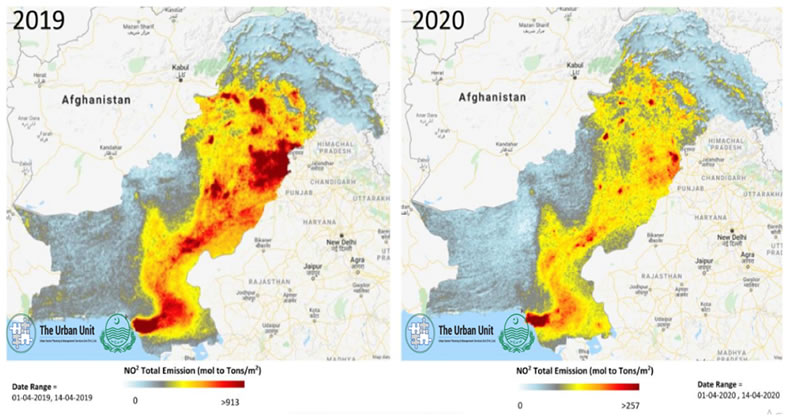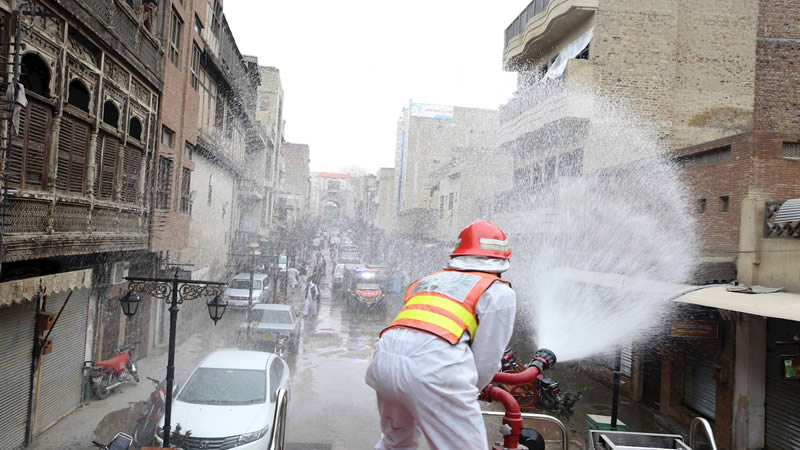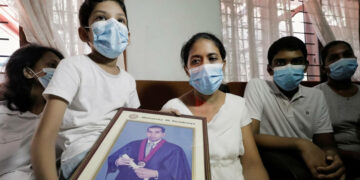As the deadly coronavirus pandemic spreads around the world, a wide-reaching lock down has been observed with a clear notion of ‘Stay Home, Save Lives’. The lockdown came up with certain restrictions on the movement of people and halted the transportation, agricultural as well as industrial practices across the globe.
Pakistan reported its first pandemic case on 26th February 2020 and closed its border with Afghanistan, Iran and China declaring a medical emergency. The provinces shut down the educational institutes, suspended intercity transport services, markets, offices, shopping malls, restaurants, public areas. Moreover, the Pakistan government limited train operations and suspended all domestic and international flights within a month and the orders are extending due to uncontrolled pandemic situation. Beside all these downsides of COVID 19, there is one upside which is the revival of blue-sky days in Pakistan; the country which was facing world’s deadliest air is now showing a glimpse of cleaner air.

Nitrogen & sulphur oxides and particulate matter in the country’s air driven by the common culprits like emissions from transport (surface traffic and aircrafts movement), industrial activity, power plants, and crop burning have been undermining the health of citizens for many years.
Explicitly, NO2 and PM 2.5 are two pollutants, which weaken the heart and respiratory system. These have resulted in almost 128,000 death in Pakistan in a single year 2017, as per Global Burden of Disease Report 2019. Whereas, the long-term pollution has also shortened the average life expectancy of the populace by 2.7 years, relative to WHO guidelines.
While the pandemic continues to take a terrible toll, the country observes a bounce back in the air quality, especially in the hotspot capitals such as Lahore. The City saw almost 50% reduction the emission over a three-week period (24th March 2020 to 15th April 2020) when the Government implemented a ‘stay-at-home order’.
In order to assess the overall reductions in NO2 emissions, the Urban Unit conducted a comparative analysis of the pollutants and came-up with interesting findings. The levels of nitrogen dioxide have fallen drastically in the country as compared with the same period last year. The areas which typically choked worse with air pollution saw the most extreme drops in NO2 levels which are the leading factor of thousands of child asthma cases and premature deaths per year in Pakistan.
One of the major reasons of this considerable change of NO2 emissions during the lockdown period is the ban on activities which typically include suspension of public transport, limited movement of local vehicles, closure of major (polluting) industries and international borders, suspension of train / flight operations and shutdown of all non-essential businesses.
Here, the most pertinent message is to understand that during these testing times, the earth is not only giving us a hope that nature can recover with collective efforts and eco-friendly measures, but also indicating that the pollution level would rebound after the limitations set during the pandemic get over.
Hence, the message is clear. The crisis could be a dawn of new era, if governments and businesses ponder how things can be done differently after the pandemic resolves so that the temporary enhancement in the air quality can be on hold. Timely and effective decisions to transit Pakistan’s fossil fuel reliant economy towards clean energy sources; advancement in the provision of public transport while phasing out low grade fuel and vehicles; strict enforcement on industrial, energy and agricultural sector to adopt best available techniques, rigorous monitoring and change in public behavior and lifestyle could help us to achieve the future which has already been shown by the current pandemic. Finally, role of Environment Protection Department and Agency could not be ignored either. This is the right time for EPD and EPA to act wisely and make concrete efforts for long-term environmental sustainability in the country.
Urban Unit’s Facebook Page: www.facebook.com/TheUrbanUnit
Punjab Corona Control & Prevention Portal: corona.urbanunit.gov.pk











